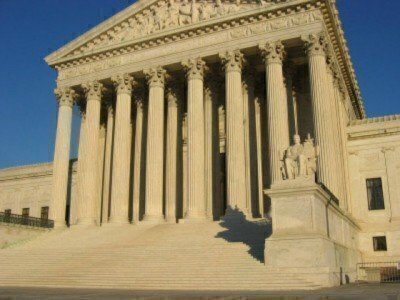Lyle Denniston, the National Constitution Center’s constitutional literacy adviser, looks at a dispute over terrorism victims suing to get Iranian bank assets held in the United States, and a famous post-Civil War precedent.
 THE STATEMENT AT ISSUE:
THE STATEMENT AT ISSUE:
“No court has ever upheld such a blatant intrusion on judicial power….[The 2012 law at issue] is merely the latest of several instances of Congress’s disregard for separation-of-powers principles to favor sympathetic [individuals]. The statute not only violates United States’ treaty obligations and imperils the United States’ reputation as a safe custodian for central bank reserves. It also threatens the judiciary’s ability to operate as an independent branch rather than a mere adjunct resolving property disputes as the legislature may direct.”
– Arguments made by lawyers for the central bank of Iran, Bank Markazi, urging the Supreme Court to strike down a 2012 law that the lawyers say dictated the outcome of a specific case pending in federal court against the bank.
WE CHECKED THE CONSTITUTION, AND…
As long ago as 1872, in a famous post-Civil War decision, the Supreme Court told Congress that it had no business stepping into a pending court case and dictating how it should come out. That decision in U.S. v. Klein remains one of the federal courts’ most important declarations of judicial independence, and it is still having an impact.
Sometimes, historically, disputes over the division of powers among the branches of the national government get a bit fuzzy around the edges; it isn’t clear when one branch is stepping into the domain of another. The situation in the Klein case is not like that.
In that case, Congress had passed a law directing courts to treat pardons of Confederate sympathizers as conclusive proof that they had been disloyal during the Civil War, thus making them or their heirs ineligible to recover property that had been confiscated during the war. The Supreme Court declared that Congress may not prescribe a rule of decision that binds the courts, because that violates the doctrine of separation-of-powers.
The Klein case illustrates why, every now and then, Congress decides that it will not trust the courts to deal fairly with some sympathetic persons. In recent years, that is becoming more common in terrorism cases. Individuals who are victims of terrorist acts file a lawsuit in U.S. courts against a foreign government for allegedly sponsoring terrorist acts, but when they win, they can’t collect because that foreign government will not respect the award of money to the victims. The victims thus must try to locate assets that the foreign government has within the U.S., and thus within the reach of a federal court to require a turnover of the assets.
A case now before the Supreme Court involves just that scenario. A group of more than 1,300 Americans who claimed to be victims of terrorist acts sponsored by Iran’s government sued the government, for themselves or for heirs of victims. Among the attacks was the 1983 bombing of the U.S. Marine barracks in Beirut, Lebanon, that killed 241 American servicemen and wounded dozens of others. The attacks also included the 1996 bombing of the Khobar Towers in Saudi Arabia, where U.S. Air Force personnel were staying. Some 19 servicemen died in that bombing, the result of a more powerful explosion than the one in Beirut.
Relatives of those killed or wounded won judgments against the Iranian government, but that government refused even to take part in the case. So “default judgments,” potentially running into the billions of dollars, were awarded.
Iran’s central bank was discovered to have an ownership interest in about $1.75 billion in bonds held in a U.S. bank in New York City. The bank claimed that it has immunity to the seizure of those assets, as a sovereign foreign government. But Congress had displaced that defense.
Wanting to make doubly sure that they could get those assets, the victims sent their lawyers and lobbyists to Congress. The lawmakers passed a bill that specifically identified that one court case and those assets, and directed that they be turned over if the judge ruled that they did, indeed, belong to Bank Markazi, and not to anyone else. The federal judge easily resolved those issues and ordered that the bonds be handed over. A federal appeals court agreed, finding that Congress had left enough for the courts to decide, so it had not violated the separation-of-powers doctrine.
Bank Markazi asked the Supreme Court to review the case, relying primarily upon the U.S. v. Klein precedent from 1872. The Justices did not take on the case itself, but did ask the Obama administration to offer its reaction to the lower court rulings.
This kind of financial conflict can disrupt relations between governments, and that might be particularly true at this point, when the U.S. is engaged in sensitive diplomatic negotiations with Iran’s government over establishing a new and less hostile relationship. When the government offers its views to the Justices, the court could be drawn into the middle of a tense situation.






